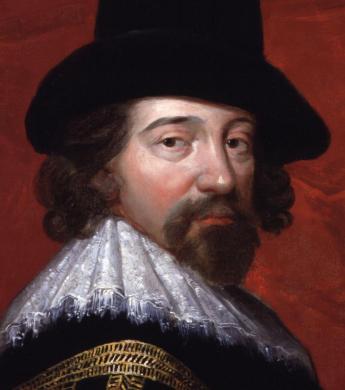Antiquarian Booksellers' Association of America Lighthouse Books, ABAA
Collecting Rare Books and First Editions - Happy birthday, Sir Francis Bacon

By Michael Slicker
January 22nd is the birthday of English statesman, philosopher, writer Sir Francis Bacon (1561), whose writings are said to have had great influence on modern science, law and society. There is also a school of thought that credits him with some or all of the works of William Shakespeare, though that idea has largely been discredited.
In any case, what is known is that Bacon was, for a time at least, an influential thinker and politician during the reigns of Elizabeth I and James I, something of a feat in itself, given that the two courts were not on the best of terms with each other. He enjoyed the favor of Queen Elizabeth I, whom he had met while he was a student at Cambridge. The queen seems to have admired his brilliant young mind. Later, he served the queen as prosecutor of his former friend, Robert Devereau, who was convicted of treason and beheaded. Bacon then wrote an account of the whole affair for Elizabeth, which was published after heavy editing from Elizabeth and her advisors.
Still later, Bacon proved adept at navigating the treacherous waters of palace intrigue and found favor with James I, who appointed him to several high positions, including attorney general and lord chancellor. Eventually, he was charged with corruption and removed from office, though not stripped of his various noble titles. Bacon admitted that he took payments from those appearing before him but he said it hadn't influenced his legal decisions. It was only after his failure at public life that Bacon devoted himself to writing and study.
Bacon advanced the theory of gathering empirical evidence to arrive at scientific principles. He is credited with developing the first ideas about the use of the scientific method for investigating scientific ideas. He wrote Novum Organum (1620) on the subject. Bacon advanced the idea that scientific study ought to have practical application in the betterment of mankind. In Of Proficience and Advancement of Learning Divine and Human (1605), Bacon laid out a plan for modern education, making a case for advanced learning and defining disciplines of study. He also envisioned a utopian society on an island somewhere between Peru and Japan in New Atlantis (1627). In this land, the people were honest, chaste, and pious.
Only a few scholars still cling to the theory that Bacon wrote Shakespeare. The notion arose in the late 1800s, when an American writer, Delia Bacon, promoted the idea that Bacon, Sir Walter Raleigh, Edmund Spenser, Edward de Vere, and others secretly wrote plays containing codes in an effort of combat the despotism of Elizabeth and James I. Modern scholars suggest that Delia Bacon had a revolutionary agenda of her own, seeking to dash the myths of America's founding fathers.
Famously, Francis Bacon is said to have died of pneumonia after spending too much time out in the snow studying the effects of cold to preserve meat. It's clear in hindsight that Bacon should have stayed out of the cold. Instead, he relentless pursued a scientific experiment. As the story goes, he was traveling outside London to Highgate with the king's physician when they hit upon the idea that snow could preserve meat. They bought a chicken from a woman and had it cleaned and then stuffed it with snow. The exposure to the cold got Bacon sick and he couldn't travel so he took refuge at the home of Lord Arundel nearby, got worse and died there days later.
(Published on the website of Lighthouse Books. Presented here by permission of the author.)
